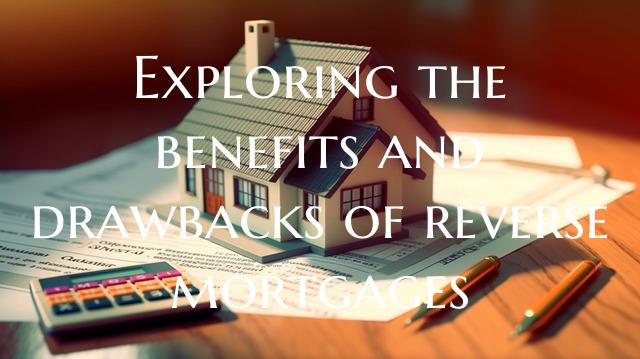Exploring the benefits and drawbacks of reverse mortgages

Reverse mortgages have become a popular financial option for many older adults seeking to tap into the equity they have built in their homes. This financial product offers a way for seniors to access funds without having to sell their home or move, but it does come with both benefits and drawbacks that are important to consider.
Benefits of Reverse Mortgages:
1. Supplemental Income: One of the key benefits of a reverse mortgage is that it provides older homeowners with a source of supplemental income. This can be especially helpful for those who are retired and looking for ways to cover expenses or enjoy their retirement without having to dip into their savings.
2. No Monthly Mortgage Payments: Unlike traditional mortgages, with a reverse mortgage, the homeowner does not have to make monthly mortgage payments. Instead, the loan is typically repaid when the home is sold or the homeowner moves out permanently.
3. Remain in the Home: Another advantage of a reverse mortgage is that it allows older adults to remain in their homes while accessing the equity they have built up over the years. This can provide a sense of stability and security for homeowners who wish to age in place.
Drawbacks of Reverse Mortgages:
1. High Fees and Interest Rates: Reverse mortgages often come with high fees and interest rates, which can eat into the equity of the home over time. It is important for homeowners to carefully consider the costs associated with a reverse mortgage before deciding to move forward.
2. Impact on Inheritance: Since the equity in the home is used to repay a reverse mortgage, there may be less value left in the home to pass on to heirs. This can be a drawback for those who are concerned about leaving a legacy to their loved ones.
3. Potential Risk of Default: If the homeowner is unable to pay property taxes, homeowners insurance, or maintain the home, they may be at risk of defaulting on the reverse mortgage. This could result in the loss of the home, so it is crucial for homeowners to carefully weigh the risks associated with a reverse mortgage.
In conclusion, reverse mortgages offer both benefits and drawbacks for older adults looking to access the equity in their homes. It is important for individuals considering a reverse mortgage to thoroughly research and understand the terms and implications before making a decision. Consulting with a financial advisor or housing counselor can also help in evaluating whether a reverse mortgage is the right option for your financial situation.
